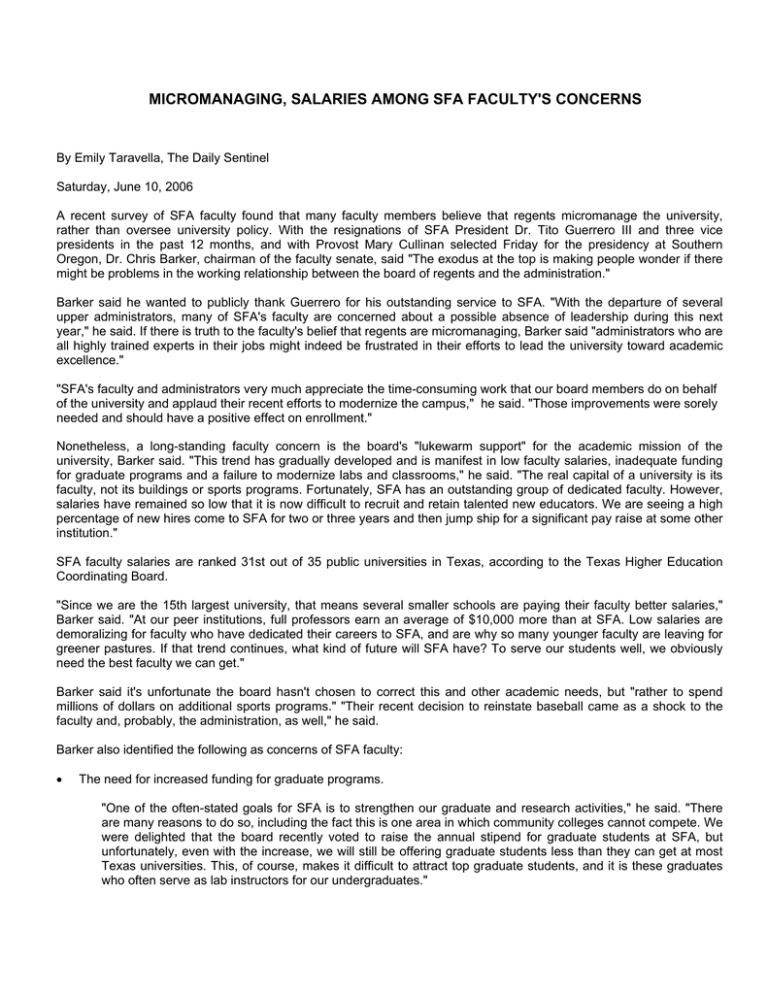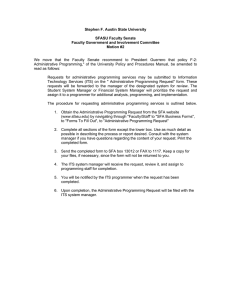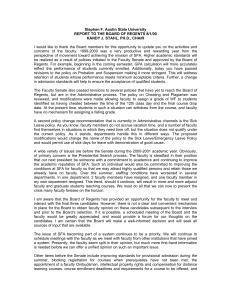MICROMANAGING, SALARIES AMONG SFA FACULTY'S CONCERNS
advertisement

MICROMANAGING, SALARIES AMONG SFA FACULTY'S CONCERNS By Emily Taravella, The Daily Sentinel Saturday, June 10, 2006 A recent survey of SFA faculty found that many faculty members believe that regents micromanage the university, rather than oversee university policy. With the resignations of SFA President Dr. Tito Guerrero III and three vice presidents in the past 12 months, and with Provost Mary Cullinan selected Friday for the presidency at Southern Oregon, Dr. Chris Barker, chairman of the faculty senate, said "The exodus at the top is making people wonder if there might be problems in the working relationship between the board of regents and the administration." Barker said he wanted to publicly thank Guerrero for his outstanding service to SFA. "With the departure of several upper administrators, many of SFA's faculty are concerned about a possible absence of leadership during this next year," he said. If there is truth to the faculty's belief that regents are micromanaging, Barker said "administrators who are all highly trained experts in their jobs might indeed be frustrated in their efforts to lead the university toward academic excellence." "SFA's faculty and administrators very much appreciate the time-consuming work that our board members do on behalf of the university and applaud their recent efforts to modernize the campus," he said. "Those improvements were sorely needed and should have a positive effect on enrollment." Nonetheless, a long-standing faculty concern is the board's "lukewarm support" for the academic mission of the university, Barker said. "This trend has gradually developed and is manifest in low faculty salaries, inadequate funding for graduate programs and a failure to modernize labs and classrooms," he said. "The real capital of a university is its faculty, not its buildings or sports programs. Fortunately, SFA has an outstanding group of dedicated faculty. However, salaries have remained so low that it is now difficult to recruit and retain talented new educators. We are seeing a high percentage of new hires come to SFA for two or three years and then jump ship for a significant pay raise at some other institution." SFA faculty salaries are ranked 31st out of 35 public universities in Texas, according to the Texas Higher Education Coordinating Board. "Since we are the 15th largest university, that means several smaller Barker said. "At our peer institutions, full professors earn an average demoralizing for faculty who have dedicated their careers to SFA, and greener pastures. If that trend continues, what kind of future will SFA need the best faculty we can get." schools are paying their faculty better salaries," of $10,000 more than at SFA. Low salaries are are why so many younger faculty are leaving for have? To serve our students well, we obviously Barker said it's unfortunate the board hasn't chosen to correct this and other academic needs, but "rather to spend millions of dollars on additional sports programs." "Their recent decision to reinstate baseball came as a shock to the faculty and, probably, the administration, as well," he said. Barker also identified the following as concerns of SFA faculty: • The need for increased funding for graduate programs. "One of the often-stated goals for SFA is to strengthen our graduate and research activities," he said. "There are many reasons to do so, including the fact this is one area in which community colleges cannot compete. We were delighted that the board recently voted to raise the annual stipend for graduate students at SFA, but unfortunately, even with the increase, we will still be offering graduate students less than they can get at most Texas universities. This, of course, makes it difficult to attract top graduate students, and it is these graduates who often serve as lab instructors for our undergraduates." • Housing for foreign and married graduate students at SFA. Their previous housing has been, or is about to be, torn down. "These groups have special needs, little money, and often no transportation," Barker said. "Foreign students are not allowed to have outside jobs, so they can't improve their financial situation. These groups need subsidized housing on or adjacent to campus. In that kind of setting, they can develop the support networks they need to help them through their graduate experience." • SFA has fallen behind in updating labs and classrooms. "Most of our lab facilities were built years ago for teaching undergraduates," Barker said. "Many of the labs are still adequate for teaching, but science has advanced significantly and our labs and analytical equipment are now outdated for many graduate-level research activities. If SFA is going to grow beyond its beginnings as a teachers college, these needs have to be addressed." • A new mandate at the state level to limit all majors to 120 hours. "Most majors are now 130+ hours," Barker said. "This was a cost-cutting move, but it will have the effect of limiting students to taking only core and major courses - all of the elective options that have enriched the learning experience of generations of students will have to be eliminated. One aspect that has set American college graduates apart is the depth of their education and their creative problem-solving skills. It would be a great shame if our students lose that competitive edge." Barker said the faculty would also like to see the university follow Guerrero's lead by continuing to increase academic standards at SFA. "A seeming paradox is that stiffer entrance requirements usually result in more applications, not fewer," he said. "Parents want their sons and daughters to go to college where they know the standards are high and students are bright." To strengthen SFA, Barker said "At the very least, there should be a moratorium on building any new sports facilities until all of the university's academic needs are fully addressed."






